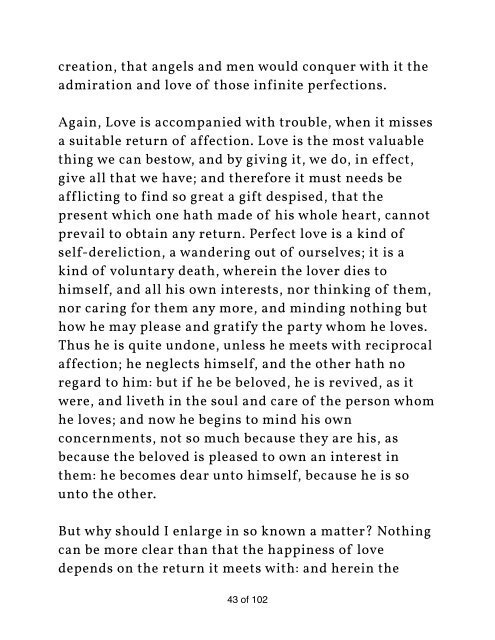The Life of God in the Soul of Man by Henry Scougal
The book instrumental in George Whitefield’s conversion The Life of God in the Soul of Man (1677), was originally written as a private letter to a ‘dear’ friend, to explain Christianity. It was never intended for publication. Yet it has become a classic Puritan text and one of the most read and influential treatises ever written for the comfort of God’s saints.
The book instrumental in George Whitefield’s conversion The Life of God in the Soul of Man (1677), was originally written as a private letter to a ‘dear’ friend, to explain Christianity. It was never intended for publication. Yet it has become a classic Puritan text and one of the most read and influential treatises ever written for the comfort of God’s saints.
You also want an ePaper? Increase the reach of your titles
YUMPU automatically turns print PDFs into web optimized ePapers that Google loves.
creation, that angels and men would conquer with it <strong>the</strong><br />
admiration and love <strong>of</strong> those <strong>in</strong>f<strong>in</strong>ite perfections.<br />
Aga<strong>in</strong>, Love is accompanied with trouble, when it misses<br />
a suitable return <strong>of</strong> affection. Love is <strong>the</strong> most valuable<br />
th<strong>in</strong>g we can bestow, and <strong>by</strong> giv<strong>in</strong>g it, we do, <strong>in</strong> effect,<br />
give all that we have; and <strong>the</strong>refore it must needs be<br />
afflict<strong>in</strong>g to f<strong>in</strong>d so great a gift despised, that <strong>the</strong><br />
present which one hath made <strong>of</strong> his whole heart, cannot<br />
prevail to obta<strong>in</strong> any return. Perfect love is a k<strong>in</strong>d <strong>of</strong><br />
self-dereliction, a wander<strong>in</strong>g out <strong>of</strong> ourselves; it is a<br />
k<strong>in</strong>d <strong>of</strong> voluntary death, where<strong>in</strong> <strong>the</strong> lover dies to<br />
himself, and all his own <strong>in</strong>terests, nor th<strong>in</strong>k<strong>in</strong>g <strong>of</strong> <strong>the</strong>m,<br />
nor car<strong>in</strong>g for <strong>the</strong>m any more, and m<strong>in</strong>d<strong>in</strong>g noth<strong>in</strong>g but<br />
how he may please and gratify <strong>the</strong> party whom he loves.<br />
Thus he is quite undone, unless he meets with reciprocal<br />
affection; he neglects himself, and <strong>the</strong> o<strong>the</strong>r hath no<br />
regard to him: but if he be beloved, he is revived, as it<br />
were, and liveth <strong>in</strong> <strong>the</strong> soul and care <strong>of</strong> <strong>the</strong> person whom<br />
he loves; and now he beg<strong>in</strong>s to m<strong>in</strong>d his own<br />
concernments, not so much because <strong>the</strong>y are his, as<br />
because <strong>the</strong> beloved is pleased to own an <strong>in</strong>terest <strong>in</strong><br />
<strong>the</strong>m: he becomes dear unto himself, because he is so<br />
unto <strong>the</strong> o<strong>the</strong>r.<br />
But why should I enlarge <strong>in</strong> so known a matter? Noth<strong>in</strong>g<br />
can be more clear than that <strong>the</strong> happ<strong>in</strong>ess <strong>of</strong> love<br />
depends on <strong>the</strong> return it meets with: and here<strong>in</strong> <strong>the</strong><br />
43 <strong>of</strong> 102

















